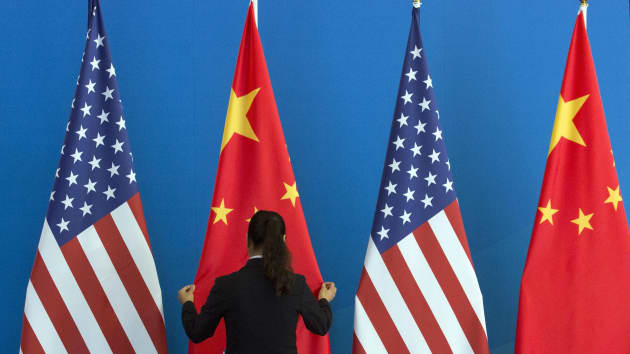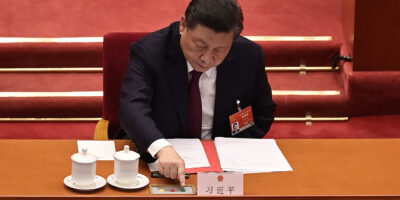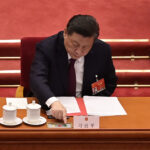
Intel is under fire in China after its decision to shun off Xinjiang. Source:
Intel under fire in China after shunning Xinjiang
- In an open letter to its suppliers, the US tech giant said it is “required to ensure our supply chain does not use any labor or source goods or services from the Xinjiang region in China.
- Chinese social media users have ever since been calling for a boycott of the US chipmaker.
Update: Intel issued an apology statement briefly after this article was published. The tech giant said that its commitment to avoid supply chains from Xinjiang was an expression of compliance with US law, rather than a statement of its position on the issue.
The United States has long criticized China over the alleged widespread torture and repression of the mostly Muslim Uyghurs and other religious and ethnic minorities in Xinjiang.
At the same time, Beijing has repeatedly dismissed all those allegations and claimed it to be borne of “political motivation” and “disinformation.”
Allegations and retaliation from both parties have resulted in continued tit-for-tat sanctions with Washington banning imports from the region and China taking “necessary measures” to prove its steadfastness.
To recall, the Chinese government’s oppression of Uyghurs and other Turkic Muslims in the region is not a new phenomenon, but in recent years, has reached unprecedented levels.
By July this year, the White House opted to issue a tough warning to US companies doing business in the Xinjiang province.
Calling US investments a potential threat, the government has warned American firms that they may wind up breaking the law if they don’t leave the region, a move that has prompted accusations of hypocrisy from Beijing.
In a Xinjiang Supply Chain Business Advisory published jointly by the State Department, Treasury, Commerce, Homeland Security, Labor, and the Office of the US Trade Representative, it was stated that “Businesses and individuals that do not exit supply chains, ventures, and/or investments connected to Xinjiang could run a high risk of violating US law.”
Between a rock and a hard place, there is Intel
In 1985, when Intel entered the Chinese market, it was one of the first American companies to do so following China’s reform and opening-up.
Inevitably, the company has reaped huge benefits from China over those decades — by 2020, 26% of Intel’s revenue came from mainland China and nearby Hong Kong.
Nearly 10% of the company’s properties, factories, and equipment are located in China.
Yet, to the surprise of many, especially Chinese netizens, the US chipmaker told its suppliers in a public letter to not source products or labor from the northwestern region of Xinjiang.
According to a report by Reuters, Intel said it had been “required to ensure that its supply chain does not use any labor or source goods or services from the Xinjiang region”, following restrictions imposed by “multiple governments”.
Intel just joined sanction on suppliers frm #Xinjiang, China pic.twitter.com/2T7TSJEd1Q
— Carl Zha (@CarlZha) December 21, 2021
The letter has caused a stir and led to severe criticism from Chinese users on Chinese social media, especially Twitter-like service Weibo.
In fact, Bloomberg said a hashtag on the topic has generated more than 250 million views on Weibo.
As the nationalist tabloid run by the ruling Communist Party’s People’s Daily, Global Times puts it, the move by Intel is “an attempt to prove the company’s own innocence under the pressure of the extreme political environment in the US, as well as pleasing US society with some fine words.”
To date, not many American companies have done what Intel did.
Global Times, in a separate report, added: “Most US enterprises, which Chinese people are familiar with, hesitantly and negatively support Washington’s demands to boycott Xinjiang’s products made by the so-called forced labor,”
Experts reckon that Intel “could afford this move simply because there are very few Xinjiang products in its current supply chain, and its CPU is rigidly demanded in China.”
It seems that Intel isn’t worried about retaliation from China and sees this as a move that favors the US and Western world, never mind that China is Intel’s largest international source of business revenue for six consecutive years.
Even in Europe earlier this year, French authorities opened a “crimes against humanity” probe into four fashion brands namely Uniqlo, Zara-owner Inditex, and French textile firm SMCP (not to be confused with news outlet South China Morning Post).
The move came after complaints from the European Uyghur Institute and other pressure groups that those retailers were profiting from the use of forced labor from Xinjiang.
For context, the Xinjiang region produces 85% of China’s cotton and accounts for about a fifth of global cotton supplies.
A quick apology
Briefly after this article was published, Intel issued an apology statement over its open letter to suppliers. “We apologise for the trouble caused to our respected Chinese customers, partners and the public. Intel is committed to becoming a trusted technology partner and accelerating joint development with China,” Intel said as per Reuters‘ report.
READ MORE
- Micron Technology invests RM1 Million for semiconductor research at Malaysian universities
- Shein, Shopee and Meesho overtake Amazon in 2021
- Data security is an expectation for APAC consumers
- Malware exploits Microsoft’s e-Signature verification
- What’s spooking Tencent and making them sell their shares off?


